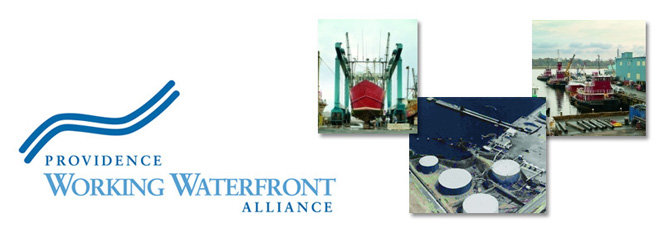Responding to an opinion piece by Working Waterfront Alliance member Julie Gill of the Oil Heat Institute of Rhode Island, Patrick Conley’s “Little People vs. Big Oil” letter to the editor in the February 4th Providence Journal contains a number of inaccuracies and misleading statements.
Conley comments:
The new comprehensive plan and its anticipated re-zoning would have no legal impact on Sprague.
Working Waterfront response:
While the comprehensive plan’s anticipated re-zoning would not have an immediate legal impact, the plan would allow for mixed use condos or hotels to be located directly adjacent to Sprague’s Allens Ave. terminal. Future condo residents and hotel guests are sure to complain about the noise and constant truck traffic typical of a busy industrial oil terminal. These complaints will inevitably lead to political pressure to impose operating restrictions on Sprague’s business which could ultimately force the terminal’s closure.
Conley comments:
Since Ms. Gill holds no position in the Salt Spreading Institute, she did not address the visual affront and the environmental hazard created by Sprague’s mountain of salt. It is the most prominent feature on the Providence landscape for travelers approaching the Renaissance City from the south. Apart from visual pollution, the salt also pollutes the river as it melts and drains into the immediately adjacent water. The usually vigilant Coastal Resources Management Council should open salt talks with Sprague Energy.
Working Waterfront response:
Sprague’s salt pile is in compliance with all state and federal environmental regulations and does not pollute the water in the Port of Providence. This stands in sharp contrast to Mr. Conley’s development which dug up contaminated soils without the proper permits from the Rhode Island Department of Environmental Management. Further, while Mr. Conley may not like its visual appearance, the pile is an essential source of road salt for public works departments throughout the state and region to maintain the safety of our roads and highways during the winter.
Conley comments:
Ms. Gill suggests that my prospective recreational marina, though shielded by my huge fixed pier (“Dock Conley”), would pose a navigational hazard to oil tankers. Does she know that a recreational marina is owned and operated by Sprague as part of its oil terminal in Portland, Maine? Are Rhode Island’s famed yachtsmen less skilled than those in Maine? Are we more likely to ram a tanker than the sailors of Portland or those of other coastal cities that have both marinas and terminals in their harbors?
Ms. Gill also suggests that a ship backing out of the Wilkes-Barre Pier on the opposite shore could cross the half-mile channel and “demolish” my proposed marina “the first time” one backed out of that facility. I would ask Ms. Gill and her purported experts how many times in the last 100 years has a ship backing out of the East Providence terminal run aground on the Providence shore? That imaginary vessel could just as easily back into the Sprague pier or the IWAY Bridge or ram into the LNG storage tank at ProvPort. Are Rhode Island tugboat operators and Bay pilots so incompetent as to back so far off course?
Working Waterfront response:
Sprague purchased a break-bulk terminal in Portland, Maine in 2004 which included a small marina with a limited number of boat slips in an area to the north of the terminal. At the request of the facility’s former owner, Sprague agreed to continue to operate the marina under restrictive conditions. All boat owners using the marina must acknowledge by contract that the facility is an industrial worksite, that industrial activities take precedence, and that Sprague is not liable for any boat damage as a result of those industrial activities.
Further, Ms. Gill’s op-ed piece does not make the argument that Rhode Island’s yachtsman, tug operators, and Bay pilots do not know how to steer their vessels. Rather, her piece points to a very specific effect, propeller wash, which occurs when large ships and barges are turned around in the Port of Providence by powerful tug boats. Mr. Conley’s proposed marina would be directly adjacent to the vessel turning basin for the Sprague, Capital Properties and Promet Marine docks. The force of the propeller wash generated by tugs in the turning basin could easily overturn recreational boats in Mr. Conley’s proposed marina.

